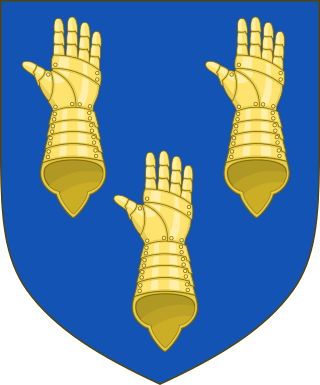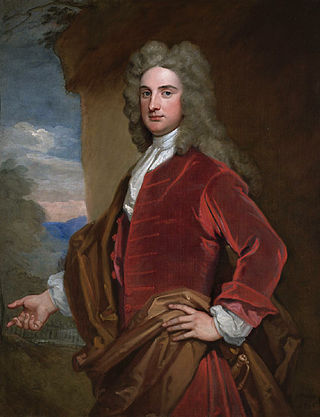Related Research Articles

William Cavendish, 3rd Duke of Devonshire, was a British nobleman and Whig politician who sat in the House of Commons from 1721 to 1729 when he inherited the Dukedom.

William Pulteney, 1st Earl of Bath, was an English Whig politician and peer who sat in the British House of Commons from 1707 to 1742 when he was raised to the peerage as the Earl of Bath by George II of Great Britain. He is sometimes represented as having served as First Lord of the Treasury and Prime Minister of Great Britain as part of the short-lived ministry in 1746, although most modern sources do not consider him to have held the office.

Henry Vane, 1st Earl of Darlington, PC, known as Lord Barnard between 1753 and 1754, was a British politician who sat in the House of Commons from 1726 to 1753 when he succeeded to a peerage as Baron Barnard.

Henry Newport, 3rd Earl of Bradford was an English peer and Whig politician who sat in the House of Commons between 1706 and 1722.
Daniel Pulteney was an English government official and politician who sat in the House of Commons from 1721 to 1731.

Sir John Rushout, 4th Baronet, of Northwick Park, Worcestershire was a British Whig politician who sat in the House of Commons for 55 years from 1713 to 1768. He was a supporter of Pulteney in opposition to Walpole, and was briefly part of an Administration. He was Father of the House from 1762.

Sir John Eyles, 2nd Baronet of Gidea Hall in Essex, was a British financier and politician who sat in the House of Commons from 1713 to 1734. He was Lord Mayor of London in 1726. He served as a Director of the East India Company 1710-14 and again 1717-21 and was appointed a sub-governor of the South Sea Company in 1721.
The Honourable Alexander Hume-Campbell KC, of Birghamsheil, Berwickshire, was a Scottish lawyer and politician who sat in the House of Commons almost continuously from 1734 to 1760.
John Bond, of Tyneham in Dorset, was an English lawyer and politician who sat in the House of Commons from 1721 to 1744.
John Pulteney, of St James's, Westminster and Harefield, Middlesex, was an English lawyer and Whig politician who sat in the English and British House of Commons from 1695 to 1710.

William Clayton, 1st Baron Sundon of Sundon Hall, Sundon, Bedfordshire was a British Treasury official and politician who sat in the House of Commons from 1716 to 1752.

Henry Furnese, of Gunnersbury House, Middlesex, was a British merchant and politician who sat in the House of Commons between 1720 and 1756.
Colonel John Selwyn of Matson, Gloucestershire,a British Army officer, courtier and politician, sat in the House of Commons between 1715 and 1751.
John Jeffreys of The Priory, Brecon, and Sheen, Surrey, was a Welsh politician who sat in the House of Commons from 1734 to 1766. He lost a fortune gambling but was awarded lucrative public positions under successive Administrations.
Harry Waller was a British lawyer and Whig politician who sat in the House of Commons from 1726 to 1747.
John Campbell (1664–1739) was a Scottish politician who sat in the House of Commons from 1721 to 1734.
John Weaver (1675–1747), of Morville, near Bridgnorth, Shropshire, was a British lawyer and Whig politician who sat in the House of Commons from 1713 to 1734.
Townsend Andrews of Coulston, Wiltshire, was a British official and Whig politician who sat in the House of Commons from 1727 to 1737.
John Cornwallis was a British politician who sat in the House of Commons from 1727 to 1747.

Walter Lloyd, of Peterwell, Cardiganshire, was a British lawyer and Whig politician who sat in the House of Commons from 1734 to 1742.
References
- ↑ "MERRILL, John (d.1734), of Lainston, Hants". History of Parliament Online. Retrieved 30 December 2018.